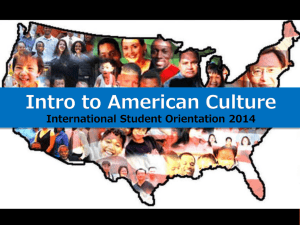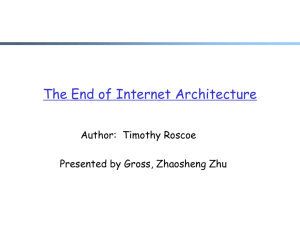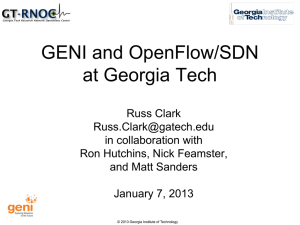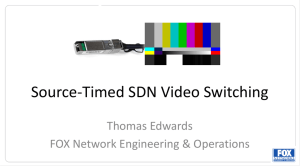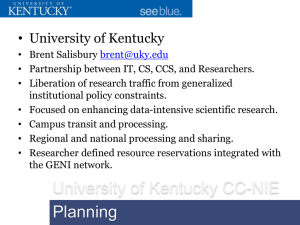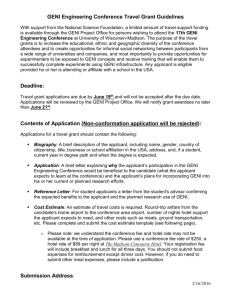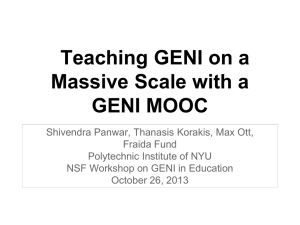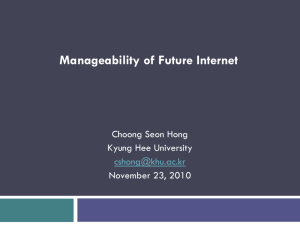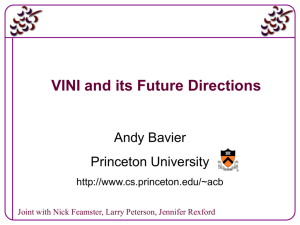Experiences with classes that are more IT networking oriented than
advertisement
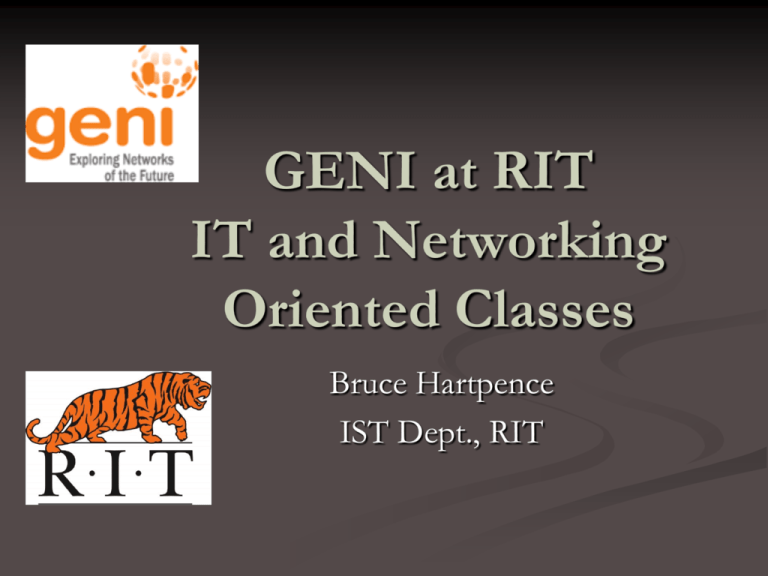
GENI at RIT IT and Networking Oriented Classes Bruce Hartpence IST Dept., RIT A little about RIT RIT – eight colleges GCCIS houses CS, SE, IST, IM, Ph.D. Neighbors: CE, Telecom, Engr Current IST and CompSec departments grew out of a very large IT program Somewhere in the neighborhood of 1200 undergrad, 600 grad, 55 faculty Facilities Lots of open computing labs Central to networking, sys admin and security were 5 labs dedicated to our area The Institute actually spent money on our labs Lots of donations Cascade Classwork A vast majority of our undergrad classes are lab based Cisco, Juniper, Extreme, Avaya, Linux, Windows Labs also support coursework with desktop virtualization Labwork As for GENI – I took a little convincing… Immersed in production equipment Openflow and SDN are a little off… Students have access to lots of equipment, hands on experience, security competitions, etc. Some is racked, some can be checked out from the cage As an example… QoS Shootout Router Switch Node A video T Gamer T Gamer Router DTE S DCE Router CME Switch Node B video Single Team Topology 10.0.0.0/8 Gamer Node C video DCE S DTE Router Switch T Game server Router T Gamer FTP Node D Video Switch Router CME Shootout server What about advanced lab work? Even without this shift, well-equipped labs don’t have all the answers Can I build something big? Can a student check out lots of gear? Can I run long duration projects? Do we have tools to reduce set up time? Can I have a large number of VMs? Invariably…no. But the campus resources are sufficient right? Still no. Changes to RIT Donations can dry up Shift in enrollments RIT has a greater interest in supporting research and projects Significant impact on programs Change from tuition cost models Space allocation Equipment refreshes What about students? Is there a difference between undergrads and grads? Yes. So what do they need? Our undergrads understand the lingo and the topics Many grad students have never touched a router Graduate courses are typically NOT lab-based. GENI at RIT Lots of opportunities Graduate students “non-lab” lab work Several projects slowly increasing Classwork, some of which supports growing the experiments Enterprise Computing SDN Seminar ISTE-602 Enterprise Computing Fairly broad course covering the general requirements of a large scale environment Virtualization, networking, database, cloud, services, etc. GENI was a way to give students an understanding of scale and the systems necessary to support users and experimentation ISTE-590 SDN Seminar Lots of building blocks Virtual topologies Virtualization Traditional switching models Traditional network design issues SDN architectures Building an SDN architecture Experimentation with GENI Our experiences with GENI At first students were confused by the infrastructure (just like I was at GEC 17) So, we made some video tutorials After the first assignment or so, students started to catch on Remember that there is a lot of networking behind some builds. Students were required to complete a couple of the posted projects (ex. l2 forwarding) and then design and complete their own Some even did rspecs Future Work and Classes Formalizing virtualization coursework Spending more time with the related open source projects Increased experimentation with GENI SDN studies WAN experiments IEEE 1910.1 Meshed Tree Future Work and Classes We can imagine a future with shrinking lab space and less equipment What if an entire advanced course sequence was taught on GENI? There is some previous work Could it be standardized? Would students have the same level of skill and understanding?

